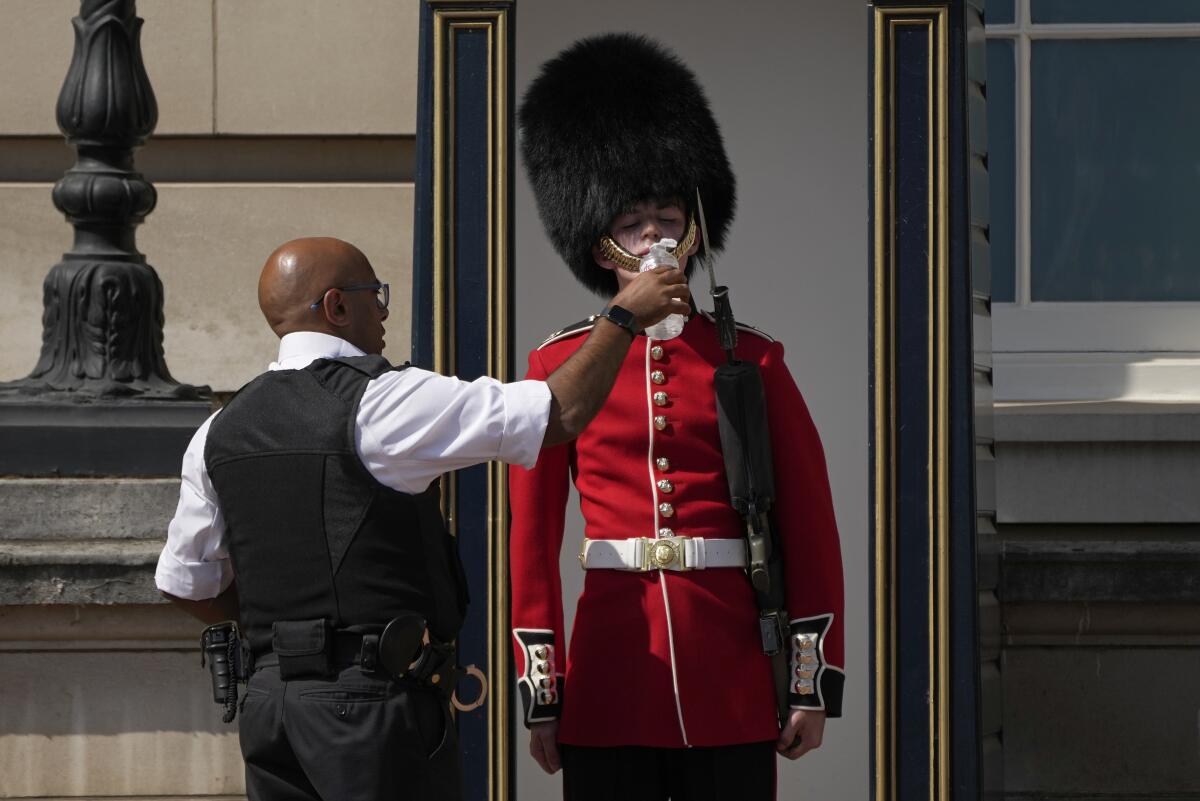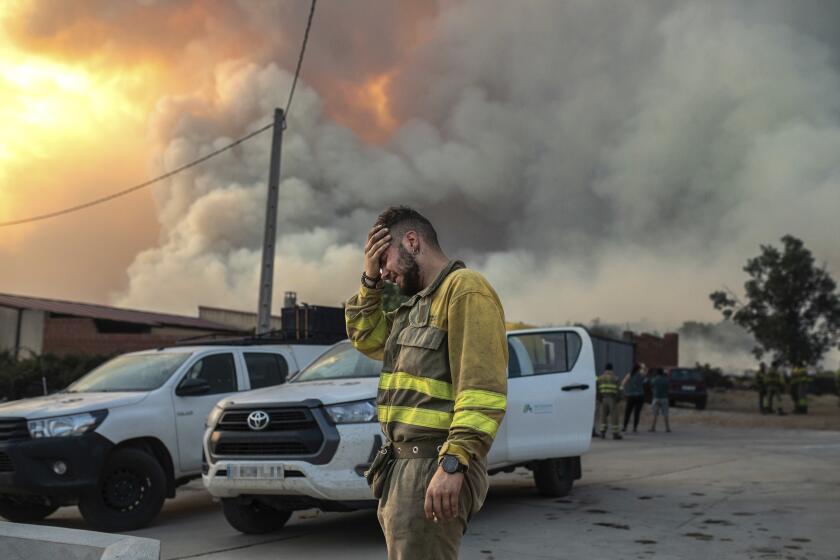Monster heat wave triggers England’s first-ever extreme heat warning

- Share via
LONDON — Millions of people in Britain stayed home or sought shade Monday under the country’s first-ever extreme heat warning, as hot, dry weather that has scorched mainland Europe for the last week moved north, disrupting travel, healthcare and education.
The red heat alert covers a big chunk of England and is due to last through Tuesday, when temperatures may reach 104 degrees for the first time, posing a risk of serious illness and even death among healthy people, according to the Met Office, Britain’s weather service.
The highest temperature ever logged in Britain is 101.7 degrees, a record set in 2019. The country is not at all prepared to handle such heat — most homes, schools and small businesses in Britain do not have air conditioning.
London’s Kew Gardens hit 99.5 degrees by 3 p.m., and Wales provisionally recorded its highest-ever temperature, the Met Office said, with 95.5 degrees at Gogerddan on the west coast.
At least four people were reported to have drowned across Britain in rivers, lakes and reservoirs while trying to cool off.
While Monday is likely to bring record highs to southeastern England, temperatures are expected to rise further as warm air moves north Tuesday, Met Office CEO Penelope Endersby said. The extreme heat warning stretches from London in the south to Manchester and Leeds in the north.
The blazes are being fed by hot swirling winds from a searing heat wave broiling much of Europe, with temperatures above 100 degrees.
“So it’s tomorrow that we’re really seeing the higher chance of [104] degrees and temperatures above that,’’ Endersby told the BBC. Temperatures of nearly 110 degrees aren’t “off the cards ... but we’re hoping it won’t be as high as that.”
Hot weather has gripped southern Europe since last week, triggering wildfires in Spain, Portugal and France. Almost 600 heat-related deaths have been reported in Spain and Portugal, where temperatures reached 117 degrees last week.
Climate experts warn that global warming has increased the frequency of extreme weather events, with studies showing that the likelihood of temperatures in Britain reaching 104 degrees is now 10 times higher than in the pre-industrial era. Drought and heat waves tied to climate change have also made wildfires harder to fight.
Officials in southern France’s Gironde region announced plans to evacuate an additional 3,500 people from towns threatened by the raging flames. More than 1,500 firefighters and water-bombing planes are trying to douse the flames in the region’s tinder-dry pine forests.
In the face of dire drought, cities and water agencies are now investing heavily in large-scale wastewater recycling facilities.
In Britain, train operators are asking customers not to travel unless absolutely necessary because the heat is likely to warp rails and disrupt power supplies, leading to severe delays. Some routes were running at reduced speed or shutting down entirely from mid-afternoon, when temperatures were expected to peak.
Some medical appointments have been canceled to relieve strain on the health service. While some schools have closed, others are setting up wading pools and water sprays to help children cool off. Most British schools have not yet closed for the summer.
The extreme heat even led Parliament to loosen its strict dress code. The speaker of the House of Commons said male lawmakers could dispense with jackets and ties for the week.
The high temperatures are even more of a shock since Britain usually has very moderate summer temperatures. Average July temperatures range from a daily high of 70 degrees to a low of 53.
Record heat. Raging fires. What are the solutions?
Get Boiling Point, our newsletter about climate change, the environment and building a more sustainable California.
You may occasionally receive promotional content from the Los Angeles Times.
Nightfall will bring little relief, with the Met Office forecasting temperatures of 84 degrees at midnight in London.
Monday night will be “very oppressive,” and it will be difficult to sleep, chief meteorologist Paul Davies said.
“Tomorrow is the day where we are really concerned about a good chance” of hitting 104 to 106 degrees, and, “with that, all the health conditions that come with those higher temperatures,” Davies said.
More to Read
Sign up for Essential California
The most important California stories and recommendations in your inbox every morning.
You may occasionally receive promotional content from the Los Angeles Times.














